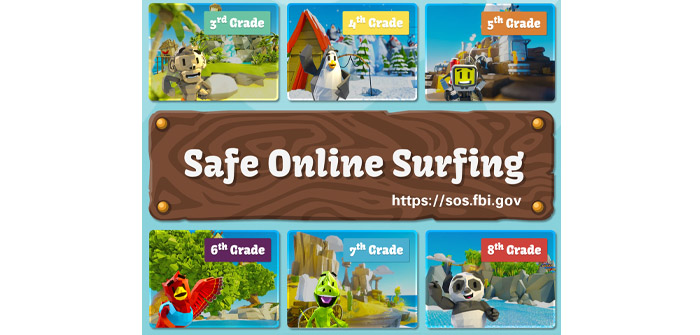(Graphic | Courtesy of Oregon FBI)
Your kids are starting to settle back into the school routine, and, as they do, many of them are carrying phones with them to class. They are also spending more and more time online for legitimate reasons — whether it is for typing exercises, research for a speech, or practicing math. While technology is an awesome tool for educators, there are steps that you can take to set your child up to be both successful and safe online.
To that end, the FBI has developed a computer literacy program called “Safe Online Surfing” or “SOS.” Teachers and administrators can utilize this program in the school setting — or parents can use it one-on-one with their children at home. The Safe Online Surfing program includes age-specific materials for grades three through eight, and it is now also available in Spanish. This program is completely free for you to use.
SOS is a series of grade-appropriate online games that allow your child to have fun while learning some important lessons. The student will explore what good online etiquette looks like, how to manage cyber bullies, and how good passwords and double authentication help keep them safe. They will learn about what they should do before downloading that new app or game onto their phone — and how to screen friend requests in a responsible way. And, they will also be able to investigate the dangers of plagiarism and privacy violations.
Here are some helpful tips for parents, as well:
- Talk to your kids about what kinds of information, photos and videos are appropriate to post online — and what’s not. Remind them that even sending one picture to a friend can lead to an entire school seeing what might be a child’s most embarrassing moment.
- Teach your kids how to limit the information they put online. They shouldn’t be posting their full name, date of birth and school information on social media platforms or give it to third party vendors.
- Train your kids that free software, apps and downloads may sound great — but in some cases they can be illegal. In other cases, you are opening up your phone and computer to potential malware attacks.
If you are a parent or educator interested in learning more about the Safe Online Surfing program — go to sos.fbi.gov.
As always, if you have been victimized by a cyber fraud, be sure to report it to the FBI’s Internet Crime Complaint Center at ic3.gov or call your local FBI office.





